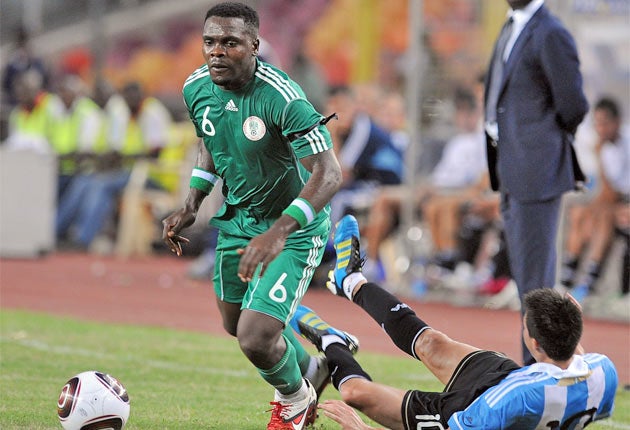Stroke of fortune helps Fifa's fight but fixing could go into overdrive
Mastermind arrested by chance as criminals look to cash in before window of opportunity is shut tight

Your support helps us to tell the story
From reproductive rights to climate change to Big Tech, The Independent is on the ground when the story is developing. Whether it's investigating the financials of Elon Musk's pro-Trump PAC or producing our latest documentary, 'The A Word', which shines a light on the American women fighting for reproductive rights, we know how important it is to parse out the facts from the messaging.
At such a critical moment in US history, we need reporters on the ground. Your donation allows us to keep sending journalists to speak to both sides of the story.
The Independent is trusted by Americans across the entire political spectrum. And unlike many other quality news outlets, we choose not to lock Americans out of our reporting and analysis with paywalls. We believe quality journalism should be available to everyone, paid for by those who can afford it.
Your support makes all the difference.The figures vary wildly. In some quarters it is claimed the illegal gambling market on football is worth $90bn. According to Chris Eaton, a snappily dressed Australian policeman who has swapped a decade with Interpol to lead Fifa's security unit, a more realistic valuation is around half that. Either way it is a vast figure and demonstrates why match-fixing syndicates, many with roots in Singapore and Malaysia, are prepared to spend large amounts in seeking to maintain a lucrative and heavily polluted income stream.
Click HERE to view graphic (122k jpg)
Match-fixing in football has deep roots – Sheffield Wednesday players were at the heart of a British betting scandal in the 1960s – but the explosion in gambling in the Far East and the global reach of match-fixers with links to organised crime has seen a rapid spread of the problem, one whose scale is now being exposed in part due to Fifa's belated moves to fight back to protect the sport's on-field integrity.
"You are chasing people who are greedy and greedy people leave trails," said Eaton, who swapped his job as Interpol's director of operations in Nyon for a very different role along the road in Zurich.
Wilson Raj Perumal left a trail that began with a stroke of luck. The Singaporean was arrested in February as he tried to enter Finland on a fake passport. He was already a figure that Fifa's security unit were aware of and his co-operation with the Finnish authorities has confirmed to Eaton the reach, and threat, of such groups. In Lapland District Court in Rovaniemi, a small town near the Arctic Circle, Perumal was revealed to be one of six people from Asia and Eastern Europe involved in this particular match-fixing ring.
"Perumal would tell you that he's been in probably half the countries in the football world in the last 10 years. He hasn't been there as a tourist – he's been there as a match fixer," said Eaton. Perumal's name crops up regularly around a number of matches under investigation – the fake Togo team, the two international friendlies in Turkey, a Concacaf Champions League game in El Salvador. There have been other arrests too – in Turkey, Germany and South Korea. Recently, Rajendran Kurusamy, a 51-year-old Eaton alleges is a key figure in the match-fixing world, was arrested in Malaysia. He has been linked to attempts to fix Under-20 matches, an area that Eaton has highlighted as one of Fifa's main concerns.
Education, particularly around that age group, is seen as paramount, and Fifa is set to follow cricket in ensuring players are alerted to the threat and able to deal with it. "Interpol's training and development programme is a 10-year one. It recognises the need to have a cultural shift," said Eaton.
He predicts the threat will grow over the coming months as a result of efforts to drive out fixers – an outcome that Eaton defiantly insists will come to pass. He said: "At the moment we have this enormous expansion in the identification of match-fixing. They have invested heavily in the development of compromising players and officials and because they now see that Fifa is serious they realise the easy way of fixing matches will be closed so they are trying to get as much out of their investments as they can before it becomes too difficult."
The co-operation with Interpol is crucial and Eaton has also been impressed with measures in place in the UK. But he wants more from other countries. He said: "The greatest responsibility lies with governments. They are the ones that ought to be responding to criminal elements that are corrupting their athletic youth. I want to see the police organisations of the world better prepared, better trained and better able to investigate allegations of match-fixing."
Join our commenting forum
Join thought-provoking conversations, follow other Independent readers and see their replies
Comments